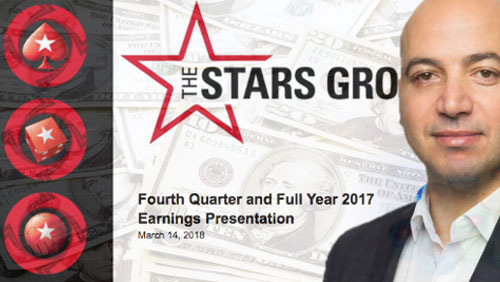Online poker contributed less than two-thirds of The Stars Group’s (TSG) fourth quarter revenue, and the company expects that figure to shrink below 60% in 2018.
 Figures released Wednesday show TSG’s revenue rising 16.1% to US$360.2m in the three months ending December 31, 2017. Adjusted earnings were flat at $147m but net earnings improved 4.7% to $47.2m.
Figures released Wednesday show TSG’s revenue rising 16.1% to US$360.2m in the three months ending December 31, 2017. Adjusted earnings were flat at $147m but net earnings improved 4.7% to $47.2m.
For the year as a whole, revenue improved 13.6% to $1.31b, while adjusted earnings gained 14.5% to $600m and net earnings shot up 91.3% to $259.3m, thanks in part to the past year’s non-core asset sell-off.
TSG continues to lessen its dependency on real-money online poker revenue from its flagship PokerStars brand, despite exiting markets such as Australia and Colombia. Poker accounted for 65.1% of Q4 revenue, down from 70% one year earlier, while combined casino & sportsbook revenue claimed a 31.2% slice, up from 25.8%. TSG expects poker’s share of overall revenue to shrink below 60% in 2018 as the casino and sports verticals continue to expand their reach.
Poker revenue totaled $234.4m (+7.9%) in Q4 and $877.3m (+3.7%), although these gains would have been a more modest 1.9% and 0.9%, respectively, absent a wind-assist from favorable exchange rates.
Combined casino and sportsbook revenue shot up 40.3% to $112.5m in Q4, while the FY figure was up 45.4% to $384m. The gains were partly due to the company’s decision to introduce its casino product into more ‘grey’ markets following the realization that regulators’ definition of what constituted a forbidden zone had grown more elastic. Casino products were available to 76% of TSG’s poker players at the end of 2017, while sports hit 64%.
TSG also continues to improve its ability to squeeze more from less, as Q4’s real-money quarterly active unique customers (QAUs) fell 7.2% to 2.17m, while the QAU figure for poker was down 9.3% to 2.03m. But customer registrations increased by 2.1m, net deposits rose 15% to $327m and quarterly net yield shot up 25.6% to $160.
Looking ahead to 2018, TSG expects revenue to come in between $1.39b and $1.47b, with adjusted earnings of between $625 and $650m. The company recently concluded a major Australian sports betting acquisition spree, taking a majority stake in CrownBet and swallowing up William Hill Australia, which the company expects will make it the market’s third-largest operator.
TSG warned of “potential negative operating conditions in Russia expected to begin in May 2018.” Russia is hosting this year’s FIFA World Cup, and has pledged an even tougher crackdown on online gambling operators not holding a Russian license, including PokerStars and its BetStars sports betting brand. The new Russian payment law takes effect on May 25, just three weeks before the World Cup gets underway.
FROM RUSSIA WITH HEADACHES
Speaking on the analyst call, TSG CEO Rafi Ashkenazi (pictured) addressed the Russian question, confirming the country was one of the six markets from which TSG derived between 5-12% of its overall revenue but declined to narrow that range to a specific figure.
TSG has been “quite robust and active” in terms of advocating for Russia to expand its legal online offering beyond sports betting but so far the company has yet to apply for a local sports betting license.
TSG said it had developed a “quite robust mitigation plan” to deal with whatever crackdown Russia’s digital enforcers might be prepping, drawing on the company’s experience with remaining operational in other markets that have imposed similar restrictions. TSG said its 2018 guidance figures included the expected impact of a reduction in its Russian revenue.
AUSTRALIA
Ashkenazi said TSG had no current plans to integrate its three-headed Australian beast in terms of technology. He noted that CrownBet had enjoyed solid growth over the past couple years and TSG isn’t interested in upsetting that applecart. However, the William Hill Australia ops will rebrand later this year.
Ashkenazi also said there may be opportunities to incorporate lessons from Australian affiliate marketing into BetStars’ European operations.
EUROPEAN UNION SHARED LIQUIDITY
TSG expects Portugal to join the France-Spain shared online poker liquidity pool sometime in Q2, although the Italian part of this planned four-way equation may not appear until Q4 at the earliest and possibly not until early 2019.
Ashkenazi characterized the early returns from the France-Spain union as “very successful,” claiming that the shared pool was now generating revenue around 30% higher than the two markets had previously contributed on an independent basis.
KENTUCKY APPEAL
TSG also shed more light on its ongoing appeal of the $870m civil judgment in the Commonwealth of Kentucky related to PokerStars’ activity in the state under its original ownership.
TSG claims to be pleased with the makeup of the three-judge panel assigned to hear the case. Oral arguments are expected to get underway in mid-April, and while there’s no timeline for a ruling, the company expects to learn its fate by late summer or early fall.
SPORTS GROWING FASTER THAN OTHER VERTICALS
BetStars’ 2017 results benefited not only from increased cross-sell and higher marketing, but also higher sports betting margins (as detailed in rivals’ recent Q4 reports). In percentage terms, sports betting is growing at a faster rate than any other vertical, which pushed casino’s share of combined casino/sports revenue down to 81% in Q4 2017 from 92% one year ago.
Ashkenazi summed up the 2017 results by saying TSG’s rebranding from Amaya Gaming had “effectively turned the page on our past” and the company was now in the “strongest position in its history.”